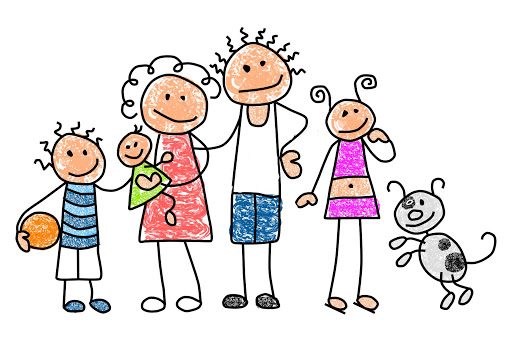Relationship and Family là chủ đề xuất hiện với tần suất tương đối cao trong phần Writing task 2. Do đó, nội dung bài viết này sẽ giới thiệu một số từ vựng liên quan đến chủ đề này cũng như cách sử dụng từ vựng để các bạn có thể tham khảo, áp dụng vào bài viết để được kết quả cao hơn.

1. Từ vựng và ví dụ
- dysfunctional (n) rối loạn chức năng
Example: Even more appropriate is that after eight years of being in that dysfunctional relationship, her kids would be on welfare and they’d all have free Obama cell phones.
Relevant collocation:
- Dysfunctional family / relationship / attitude / behavior
- Emotional / broken / abusive / incompetent dysfunctional
2. nuclear family (n) gia đình hạt nhân (gia đình gồm 2 thế hệ cha mẹ – con cái)
Example: The trend towards the nuclear family is expected to result in a large increase in the number of single elders.
Relevant collocation:
3. extended family (n) đại gia đình
Example: A strong feature is that the book includes case studies of extended family systems as well as nuclear family systems.
Relevant collocation:
4. household (n) hộ gia đình
Example: High-technology products are hard to sell to households where the head of the household is over 60 years of age.
Relevant collocation:
- Household chores / expenses / waste
- Single–person househole
5. behavioral (adj) hành vi
Example: The new chairman of the committee of managing director promised “behavioral and cultural change” at top levels of the company.
Relevant collocation:
- Behavioral problems / difficulties
6. adulthood (n) trưởng thành
Example: An adult under English law is someone over 18 years old.
Relevant collocation:
- reach / survive / enter / continue adulthood
- young / middle / late / emerging / successful / healthy adulthood
7. foster (v) chăm sóc
Example: They have fostered over 60 children during th past ten years.
Relevant collocation:
- carefully / deliberately / energetically forster
- help (to) / be designed to foster
8. bond (n) liên kết, quan hệ
Example: There has been a close bond between them ever since she saved him from drowning.
Relevant collocation:
- Close / strong / common / natural / emotional / spiritual bond
- Be linked by / feel / have bond
- Create / develop / forge / form / strengthen / break / destroy bond
9. tie (n) mối quan hệ
Example: He urged governments worldwide to break diplomatic ties with the new regime.
Relevant collocation:
- Close / strong / weak / blood / family / emotional / personal / business / commercial / economic / cultural / polittical / social / traditional tie
- Have tie
- Establish / cement / strengthen / cut / sever tie
- Loosen / weaken tie
10. rapport (n) mối quan hệ
Example: We’d worked together for years and developed a close rapport.
Relevant collocation:
- Close / easy / good / great / tremendous / personal / instant rapport
- Build / develop / establish / enjoy / have / feel rapport
11. rebellious (adj) nổi loạn, ương ngạnh
Example: Her teachers regard her as a rebellious, trouble-making girl.
Relevant collocation:
- Rebellious teenager / spirit / youth / nature / behavior
- Potentially / seemingly / fiercely / notably rebellious
12. obedient (adj) vâng lời
Example: Students are expected to be quiet and obedient in the classroom.
Relevant collocation:
- Obedient child / dog / son
- Fully / perfectly / habitually / reluctantly / strictly obedient
13. permissive (adj) dễ dãi
Example: It’s a very permissive school where the children are allowed to do whatever they want.
Relevant collocation:
- Become / be permissive
- Extremely / highly / very permissive
14. indulge (v) thưởng thức
Example: The soccer fans indulge their patriotism waving flags and singing songs.
Relevant collocation:
- Be able to / be free to indulge
15. comply (v) tuân thủ
Example: He’s been ordered to have the dog destroyed because it’s dangerous, but he refuses to comply.
Relevant collocation:
- Fully / strictly comply
- Fail to / refuse to comply
- Comply with
16. exposure (n) sự tiếp xúc
Example: Researchers concluded that low level exposure to the chemical was unlikely to cause harm.
Relevant collocation:
- Brief / greater / limited exposure
- Give somebody / get / have / increase exposre
17. sheltered (adj) che chở
Example: We found a sheltered spot to have our picnic.
Relevant collocation:
- Be / look sheltered
- Snugly / well / fairly / quite / relatively sheltered
18. Well-adjusted (adj) được giáo dục tốt
Example: The school aim to produce well-adjusted members of society.
Relevant collocation:
19. emotional security (n) cảm giác an toàn
Example: These mothers who talked about having emotional development as their children would gain a sense of emtional security and feel more at ease as a result of attending music classes.
Trên đây là tổng hợp một số tự vựng và ví dụ của chủ đề Relationship and Family. Mong rằng chúng sẽ giúp bạn có thêm kiến thức để hoàn thành bài thi IELTS tốt nhất.
Chủ đề liên quan :
- Từ vựng về Protecting Endangered Species
- Chủ đề Global Issues – IELTS Writing Task 2
- Bộ từ vựng và cấu trúc cực xịn cho IELTS Writing Task 2
source https://www.ieltsvietop.vn/tu-hoc-ielts/tu-vung-ve-chu-de-relationship-and-family/
Nhận xét
Đăng nhận xét